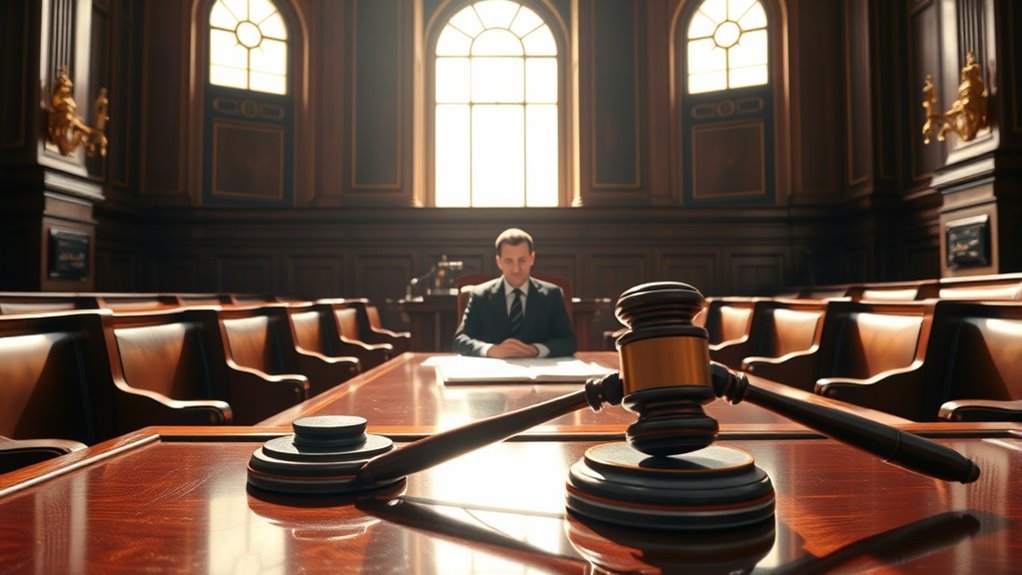Celebrity court records are difficult to seal because courts prioritize transparency to make certain public trust and fairness. They follow laws that favor open access unless there are strong privacy reasons, like protecting minors or safety concerns. Media interest and public scrutiny also pressure courts to keep records accessible. This helps prevent perceptions of hiding the truth or bias. If you want to understand more about why this is so hard, stay with us to learn additional details.
Key Takeaways
- Legal transparency laws prioritize public access unless privacy concerns are substantial.
- Celebrity cases attract extensive media coverage, encouraging courts to keep records open.
- Exceptions like juvenile or sensitive cases require high standards to justify sealing records.
- Courts have a significant burden of proof to justify sealing, emphasizing openness over privacy.
- Societal expectations for accessible justice reinforce the difficulty in sealing celebrity court records.

Have you ever wondered what it’s like behind the scenes of a celebrity’s legal life? One of the most striking aspects is how difficult it is to keep court records sealed. Unlike typical cases where privacy concerns might justify keeping documents under wraps, celebrity court records are often public knowledge. This openness stems from a combination of legal transparency requirements and the public’s right to access court proceedings, which can make sealing records a complex task.
Celebrity court records are rarely sealed due to legal transparency and public access requirements.
When celebrities face legal issues, their cases tend to attract media attention and public scrutiny. Courts are often hesitant to seal records because doing so could set a precedent that limits transparency in the justice system. Legal transparency isn’t just a principle for courts; it’s a safeguard that helps ensure fairness and accountability. If court records were easily sealed, it could lead to a lack of oversight, especially when public figures are involved. As a result, courts generally prefer to keep records accessible unless there are compelling privacy concerns, such as sensitive personal information or ongoing safety risks.
Additionally, the legal process itself emphasizes openness to prevent abuse and corruption. Courts want to maintain public confidence, and making records available helps ensure that justice isn’t obscured behind closed doors. For celebrities, this means that even if they’re involved in sensitive or embarrassing cases, the law often prioritizes transparency over privacy. While some records can be sealed in exceptional circumstances—like juvenile cases or cases involving minors—these are the exception rather than the rule. For most celebrity cases, the desire for public accountability outweighs privacy concerns.
Furthermore, legal systems often require a demonstrated need to seal records, which can be a high bar for celebrities. Privacy concerns, while valid, might be outweighed by the public’s interest in seeing the case details. Courts may also consider the potential impact on victims, witnesses, or other parties involved. The burden of proof for sealing records is substantial, and courts tend to err on the side of openness to preserve the integrity of the judicial process. This requirement for transparency aligns with legal transparency as a core principle of the justice system.
In the end, the combination of legal transparency and the societal expectation that justice remains accessible to all makes sealing celebrity court records a challenging endeavor. This environment ensures that the legal process remains fair and that the public remains informed, even if it means that some aspects of a celebrity’s legal life are laid bare for all to see.
Frequently Asked Questions
Can Anyone Request Access to Celebrity Court Records?
You can request access to celebrity court records, but privacy concerns and media influence often limit this. Courts tend to keep certain records sealed to protect individuals’ privacy, especially when media coverage could cause harm. While anyone can technically request these records, it’s difficult to get them unsealed or easily accessible because of legal protections designed to balance transparency with privacy, particularly for high-profile cases.
How Long Does It Typically Take to Seal Court Records?
They say patience is a virtue, and sealing court records isn’t quick. Usually, it takes months to navigate privacy concerns and legal procedures, depending on the case’s complexity. You’ll need to file the right motions and wait for the court’s approval, which varies by jurisdiction. Be prepared for a process that requires time and persistence, especially since courts prioritize transparency, making sealing records a careful, often lengthy, endeavor.
Are There Legal Exceptions to Sealing Celebrity Court Cases?
You might wonder if there are legal exceptions to sealing celebrity court cases. In some situations, privacy concerns and media influence can sway courts to keep records open, especially if public interest outweighs privacy. Courts may deny sealing requests if they find that transparency benefits society or if the case involves significant public figures. Your best bet is to consult a legal expert to understand specific exceptions applicable to your case.
Do Celebrities Have Special Rights Regarding Their Court Records?
You might think celebrities have special rights to keep their court records private, but the truth is, the law treats them just like anyone else. Their privacy concerns are weighed against the media influence and public interest, making sealing records nearly impossible. The media’s relentless pursuit of celebrity scandals often overrides privacy, leading courts to keep records open to balance transparency and public curiosity—celebrity status doesn’t grant them legal immunity.
How Does Public Interest Influence Court Record Sealing Decisions?
You might think court records are easily sealed, but public interest heavily influences these decisions. Courts weigh privacy concerns against media influence and the public’s right to know. When media coverage is intense, authorities often hesitate to seal records, fearing transparency. Your understanding is that courts prioritize free press and public awareness, making it challenging for celebrities to keep their court records private, especially when media influence amplifies the case’s visibility.
Conclusion
You can almost see the relentless spotlight shining through the cracks, revealing every secret behind the glossy facade. Celebrity court records are like open books, their pages fluttering in the wind for everyone to read. The desire to seal them fades against the glaring glare of public interest and transparency. So, as the court’s gavel strikes, it’s clear that in the world of fame, some stories are destined to be exposed, no matter how tightly they’re sealed.








